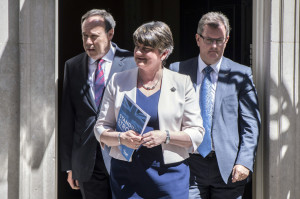Simon Lee (TC) : The agreement, following the UK general election, between the Conservative and Unionist Party and Northern Ireland’s Democratic Unionist Party (DUP) has seen both parties extend their cooperation beyond matters of confidence and supply, to vital questions of Brexit and national security.
However, perhaps the most explosive aspect of the deal, in domestic political terms, pertains to the additional £1 billion “cash for votes” agreement. This will see extra money flow to Northern Ireland over the next two years. In effect, Theresa May’s government has spent £100 million of taxpayers’ money for the support of each of the ten DUP MPs at Westminster.
In pledging that financial support, the deal states that the government “recognises that Northern Ireland has unique circumstances within the United Kingdom, not least as a consequence of responding to the challenges of the past”.
Many people in England, Scotland and Wales may have imagined the existing fiscal and constitutional settlement had already recognised in full measure Northern Ireland’s “unique circumstances”. In 2015-16, the people of Northern Ireland were recipients of the highest identifiable public spending on services in the UK, at £10,983 per person. By contrast, Scotland received £10,536 per person and Wales just £9,996 per person. In England it was a mere £8,816 per person.
Poor relations
At such a critical juncture, when the political viability of fiscal austerity has been widely challenged, this agreement will reopen the debate about the fairness of the territorial allocation of public funding within and between the nations of the UK. This is currently allocated according to the archaic non-statutory Barnett formula.
Any sense of fairness sacrificed on the altar of grubby DUP deal to let PM cling to power, & Scots Tories influence in No10 shown to be zero
— Nicola Sturgeon (@NicolaSturgeon) June 26, 2017
This system was devised in the late 1970s, prior to the election of the first Thatcher government, to determine changes to the block grants for Scotland, Wales and Northern Ireland, based upon changes in the budgets of UK government programmes in England, for example for health and education. Such calculations would be made upon the basis of comparability between services in different parts of the UK, and the different proportions of the UK population in each nation. The Conservative deal with the DUP includes an extra £200m for health services in Northern Ireland over the next two years. Under the terms of the most recent 2015 spending review, to justify spending of that kind, health funding in England would have had to have increased by £5.935bn over the same period. May will argue that its funding deal for Northern Ireland lies outside the Barnett formula. It has provided the funding to the Northern Ireland Executive in addition to its block grant, rather than as a consequence of changes to health funding in England. Therefore, there should be no additional consequential funding for Scotland or Wales. That technicality hasn’t gone down well as an excuse in Westminster, Holyrood and Cardiff. Labour leader Jeremy Corbyn insisted that “austerity has failed. Cuts to vital public services must be halted right across the UK, not just in Northern Ireland”. He further questioned where the money to fund the deal would come from, and whether all other parts of the UK would receive much needed additional funding.
The deal between the Conservatives and DUP flies in the face of the commitment to build a more united country and further weakens the UK
— Carwyn Jones (@fmwales) June 26, 2017
Carwyn Jones, the Welsh first minister, called the deal “a straight bung to keep a weak prime minister and a faltering government in office”. To him, the “outrageous” agreement “all but kills the idea of fair funding for the nations and regions” of the UK.
The English problem
However, the greatest political risks for the May government reside with the fiscal and political implications of its DUP deal for England – and with its impact upon potentially rebellious Conservative backbenchers. They are already dubious about the benefits for England of devolution, and could yet threaten the May Government’s wafer thin majority.
The Grenfell Tower fire has deepened public debate about the scale of England’s housing crisis, and the financial sustainability of local government in England, which also happens to have the lowest spending per person on health among the nations of the UK.
Meanwhile, the prime minister has found an additional £100m per year for two years to support the transformation of the NHS in Northern Ireland and another £50m per year for two years to address “immediate pressures in health and education” in Northern Ireland, while England’s schools face an average of 8% real terms’ funding cuts by 2019-20.
For the May government, an agreement with the DUP is the political price to be paid for staying in office to implement Brexit. For Wales and Scotland, the UK government’s deal with the DUP has highlighted the fiscal limitations of the current devolution settlement. For voters and MPs in England, the very different funding settlement for health and education in Northern Ireland to their own has raised important questions about the price to be paid for preserving the UK’s “precious union”.
Simon Lee, The Conversation
Source Article from https://nsnbc.me/2017/06/27/dup-takes-1-billion-to-support-theresa-may-but-at-what-cost-to-the-united-kingdom/
Related posts:
Views: 0
 RSS Feed
RSS Feed

















 June 27th, 2017
June 27th, 2017  Awake Goy
Awake Goy 











 Posted in
Posted in  Tags:
Tags: 
















